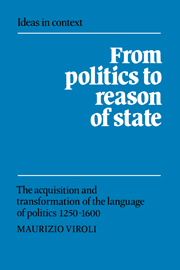 From Politics to Reason of State
From Politics to Reason of State Book contents
- Frontmatter
- Contents
- Acknowledgements
- Dedication
- Introduction
- 1 The acquisition of the language of politics
- 2 The philosophy of the city and the political man
- 3 Machiavelli and the republican concept of politics
- 4 Francesco Guicciardini: between politics and art of the state
- 5 The last glimmerings of civil philosophy
- 6 The triumph of reason of state
- Epilogue. Politics as civil philosophy
- Bibliography
- Index
- IDEAS IN CONTEXT
4 - Francesco Guicciardini: between politics and art of the state
Published online by Cambridge University Press: 02 February 2010
- Frontmatter
- Contents
- Acknowledgements
- Dedication
- Introduction
- 1 The acquisition of the language of politics
- 2 The philosophy of the city and the political man
- 3 Machiavelli and the republican concept of politics
- 4 Francesco Guicciardini: between politics and art of the state
- 5 The last glimmerings of civil philosophy
- 6 The triumph of reason of state
- Epilogue. Politics as civil philosophy
- Bibliography
- Index
- IDEAS IN CONTEXT
Summary
Francesco Guicciardini may be regarded with Machiavelli as the symbol of the epoch of transition from the language of politics to that of reason of state. They both aimed at integrating the language of civil philosophy through extensive borrowings from the language of the art of the state. Guicciardini brought the language of the art of the state to an unprecedented level of intellectual refinement and introduced the expression “reason of the states” later to become the core of the new understanding of politics. Compared to Guicciardini's Ricordi and Discourses, the works of the earlier writers on the art of the state look remarkably rudimentary. Even The Prince looks like the work of someone who knew a lot, but not all, that he needed to know in order to be credited as a professional in the art of the state, or like the work of someone who refused to speak like all the others who discussed the same subject.
Although Guicciardini's attempt to integrate the language of politics with that of the art of the state takes place in the discourse Del modo di or dinare il governo popolare (also known as the Discours of Logrogno) and in the Dialogo del reggimento di Firenze, we can find his elaborations of the art of the state in his Ricordi, on which he worked from 1521 to 1530, and in his memoranda and letters to the Medici. The core of his interpretation of the art of the state is the conviction that the art of ruling the state is substantially a derivation of the art of ruling a household and the art of commerce in general.
- Type
- Chapter
- Information
- From Politics to Reason of StateThe Acquisition and Transformation of the Language of Politics 1250–1600, pp. 178 - 200Publisher: Cambridge University PressPrint publication year: 1992


